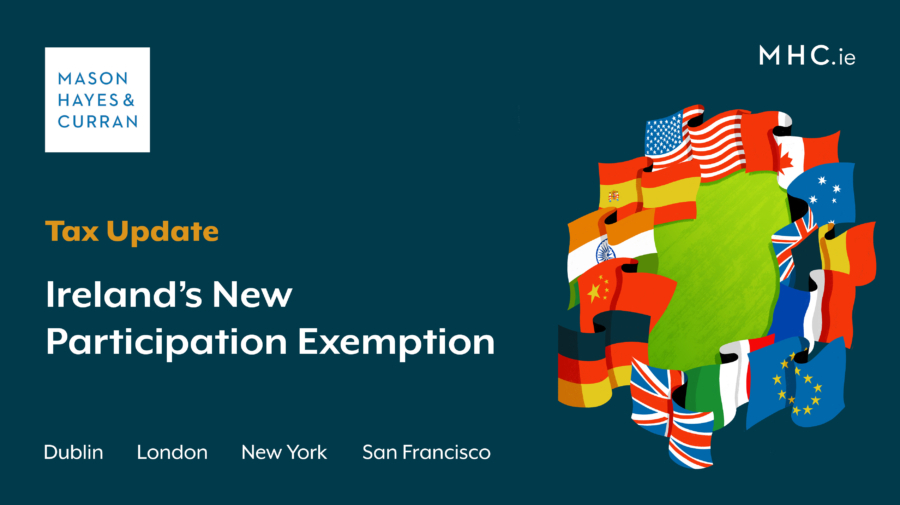Ireland’s New Participation Exemption
The final piece of the jigsaw in Ireland’s holding company regime

Ireland’s tax regime is set to become more attractive with the 2025 participation exemption for foreign dividends. This reform exempts qualifying distributions from tax, enhancing Ireland’s appeal as a jurisdiction for establishing a headquarters or holding company. Our Tax team explores the exemption’s key features and conditions, alongside the other reliefs relevant to holding companies.
Ireland’s attractive tax regime and its transparent and predictable tax system have been key drivers for some of the world’s leading public and private multinational groups establishing holding companies in Ireland. The introduction of a participation exemption for foreign dividends from 1 January 2025 will further improve Ireland’s competitiveness on the global stage. It is broadly anticipated that it will enhance Ireland's reputation as an attractive place in which to invest and do business.
Application of the exemption
The participation exemption will exempt qualifying distributions[1] made on or after 1 January 2025 from corporation tax in the hands of the recipient. Companies can opt into the exemption on an annual basis. This exemption will apply to all in-scope foreign distributions received by that company during the accounting period for which the election is made.
Existing regime
The existing tax credit system for foreign distributions will continue to apply for any accounting period for which a company does not opt into the exemption. It will also continue to apply for foreign distributions that do not qualify for the exemption.
Under that existing regime distributions received are subject to corporation tax in Ireland. However, a credit is given for tax paid overseas with the effect that generally no further tax is payable in Ireland. The existing regime is complex in terms of tracing through foreign credits, so the new exemption method is expected to simplify the tax compliance obligations for holding companies or companies with established headquarters in Ireland.
Key conditions
Key conditions of the exemption are set out in the following table. Readers should be aware that there are additional aspects not detailed here that need to be considered.
Tax residence and status of the payer |
|
Ownership of the payer by the Irish holding company |
|
Qualifying distribution |
|
Source of distribution |
|
Anti-avoidance rules
The exemption will not apply to distributions from a company where certain transactions took place in the five years before the distribution. These include merging with a company, or acquiring a business from a company, that was not resident in a Relevant Territory.
In addition, a specific anti-avoidance provision disapplies the exemption where arrangements are put in place, one of the main purposes of which is obtaining a tax advantage and those arrangements are not considered genuine.
Other features of Ireland's holding company offering
In addition to this new exemption, the following features of the Irish tax regime make Ireland an attractive location for a holding company, subject to satisfying the qualifying criteria:
- Exemption from capital gains on disposals of shareholdings of 5% or more in companies
- Exemptions from withholding tax on interest and dividends payable by Irish companies
- 12.5% rate of corporation tax for trading activities, with 25% rate for passive activities
- Expenses of managing a holding company are generally deductible for tax purposes in Ireland
- Interest deductibility on debt-financed share acquisitions
- Ireland has an extensive double tax treaty network currently with 74 countries which include all the major trading nations
- Ireland has implemented applicable EU tax directives and OECD policies on tax matters
- Ireland’s transfer pricing rules follow the OECD Guidelines
Conclusion
In our view, the introduction of this exemption is the final piece of the jigsaw in ensuring that Ireland’s holding company regime remains competitive and continues to attract global businesses.
While there are detailed qualifying conditions and anti-avoidance provisions which should be considered in advance of any distribution to an Irish holding company, it is not expected that these should affect most standard dividend payments from companies resident in the EEA or countries with which Ireland has a double tax agreement.
Existing Irish holding companies should review their corporate structure to ensure that distributions from group companies will qualify for the exemption and groups considering the establishment of a holding company in Ireland should factor the exemption into their considerations.
For more information and expert advice on all relevant taxation matters impacting your business, contact a member of our Tax team.
The content of this article is provided for information purposes only and does not constitute legal or other advice.
[1] References to distributions in this article include dividends.
Share this:





